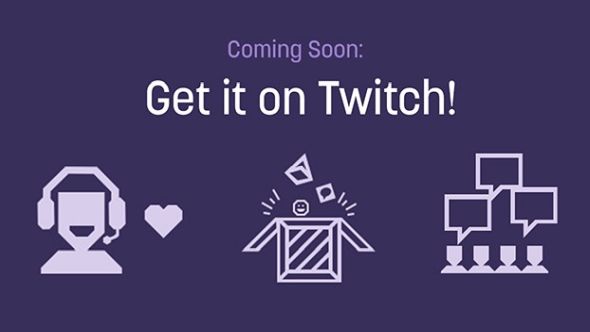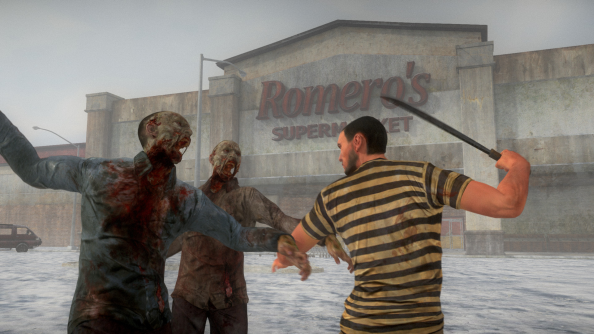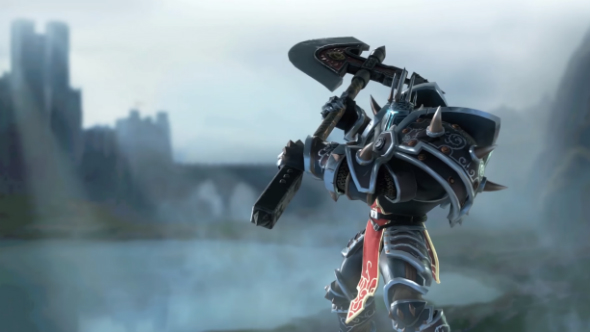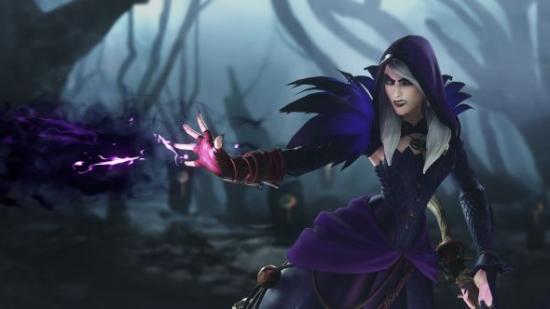What do Amazon know about games? Well, put it this way: they have their own game engine now, rooted in CryEngine, called Lumberyard. They own Twitch, and plan to sell games through it. And they run their own studios, bagging big names like Planetside and H1Z1’s John Smedley to make games perfectly suited to streaming.
Read more: the best multiplayer games on PC.
With that encroachment in mind, we picked the brains of Amazon Games VP Mike Frazzini. What does he think of Steam? The way Twitch has changed how games are experienced? And how are Amazon tools going to feature in the future works of other game developers? Read on to find out.
PCGN: Amazon seems to be quite a user-led business. If you look at the biggest player in PC gaming, Steam, how would you describe them as a user-driven platform?
MF: Interestingly you’ve teed up the question when you said Amazon focuses on users, we call them customers but it’s the same point. Our focus is on customers. We pay attention to customers, we pay attention to what competitors do but ultimately we spend the vast majority of our time talking to customers and focusing on inventing on behalf of customers. It’s a really good service, there’s a reason why people use it.
Hats off on that and as we think about when we’ve talked to game developers, what they tell us is getting discovered is hard, reaching an audience is difficult to achieve and engaging with that audience.
There’s a significant amount of opportunity to invent on behalf of customers and try to help them build reach to fans and Steam is one of those options but there can be and already are many of them. Twitch is certainly a place that today’s developers are already using to reach an audience and, with the recent announcement [of the partner program Twitch Commerce], to actually sell games while people are watching is something that they’ve been asking for. It’s really customer driven and for us there’s three sets of customers in our games business. We have gamers of course, broadcasters on Twitch and game developers. And so all of the thinking is, who are the customers? And when we talk to them, what are the things we hear and how might we go about helping them?
And for game developers we kind of hear three things. One is, ‘Help us get our game discovered and engaged with an audience’. The second one is, ‘Help us move more efficiently and spend more of our time on creative things and less of our time on undifferentiated heavy lifting’. The third one is the business of course, they’re looking for ways to make money on their games, so everything we’re doing is lined up around those three needs that we hear from developers.
That’s why we’re focusing on customers more, it’s just a richer source of ideas. For sure there’s no question that devs, you could debate how high up in the priorities it is, but at least one of the top things that they look for is just getting discovered, they call it discovery, some will call it reach, some will call it user engagement, some will call it user acquisition. These are all different forms of the same problem set and that’s what we’re really excited about.

Would you say viewers are a fourth category?
You know what, we debate this actually. Because players and viewers aren’t always the same ‘cos a lot of people will view a game but never play it, and certainly a lot of people will play a game and never view. I think internally we just think of them as consumers but as you’re thinking about the viewing experience clearly you’re thinking about it from a different kind of lens. Yes I think it’s fair, it’s just debatable.
How much do you leverage the things that Amazon have learned about product recommendation? How much will you be leveraging those inside Amazon? Amazon is a data-driven business and will show me cool stuff I should buy. How much are you thinking about that in terms of the next video on Twitch or the game you recommend on Amazon?
Those systems were built off of years of interacting with customers and what we find is if you show customers things that are more relevant to them versus less relevant, they appreciate it and they reward you with purchases or clicks or engagement or whatever and all of those things we’ve learned are always in our mindset. Customer centricity, it’s like, ‘What have we learned from customers?’. Well, if I show you a game you have no interest in or 20 you’re like, ‘Heh?’. But if i somehow inferred through your purchase behaviour, your watching behaviour, things you might be interested in – that’s a better experience. Those systems are fully embraced in everything we’re doing.
The games that Amazon is greenlighting are designed around mechanics that have been popular to watch. Has that been a big part of the selection of games you’ve funded?
Yeah absolutely. Game developers have always thought about how people are going to play their games of course. And this notion that millions and millions of customers are going to watch the game, what does it mean to have an interesting watching experience? We kind of look at this as an interesting frontier and so talking to customers of course is important and there’s a degree where you have to invent and create things that didn’t exist so with our games we think very simply that we… what would it mean if you designed a game where the experiences you have outside of playing are as important as the experience inside of playing? I don’t even know if you can achieve that but if you think of it that way you’re more likely to come up with these interesting other things people can be doing.
There’s examples of folks doing this already. In the Fallout map builder product, creation was a form of play so to speak. I wasn’t playing the game, I was making something to then play it so it was different. That notion of outside of the moment-to-moment gameplay.
In this particular question we say, ‘What makes a games fun to watch?’. And that’s an interesting question, it’s gonna take a long time to get smarter and smarter at that. Customers are definitely telling us they’re interested in watching obviously, the sheer volume of engagement is staggeringly great and awesome. Another way to put this which is I think probably the easiest and simplest way to describe is, Twitch has already changed the way games are experienced. The Twitch community has changed the way games are experienced. What’s next for the Twitch community is to change the way games are made and we’re starting to see that happen and you can start to hear different developers that are independently coming up with ideas that are like, ‘A big part of my game needs to be integrated, thinking of Twitch’.
John Smedley, who opened a studio for us in San Diego, when he built H1Z1 he was very heavily thinking about Twitch and it’s like, ‘Oh, guess what, H1Z1 is one of the most popular games on Twitch’. And that wasn’t by accident, that was a collection of choices because he just thought Twitch is a really important part of this game.

Do you worry there’s survivor bias? The games that lots of people stream on Twitch become popular because they are the good games, then there’s a surge of everyone making CCGs because Hearthstone is big on Twitch.
That’s possible, sure. I think that might be a human characteristic. The way we think about that and what’s important is – game design does this too – what are the underlying psychological things happening that causes something to be interesting and engaging? And if you focus on those underlying things you’re able to create games that are a lot different from the other games and they are unique.
And so I think similarly when you think about what are the underlying things that are engaging when you’re watching, it’s really, what are the atomic aspects to the experience that are fun and how do you potentially bear them out in new contexts? So to give you some examples: I think H1Z1 is a good one. Dead By Daylight is an awesome game, does very well on Twitch. Those are examples where the teams thought about how they might engage on Twitch but they’re also, I think, very different games. We’re early on in this and we’re doing a lot of research for our teams but there are couple of things you notice. Competitive plays are always engaging to watch but, guess what, it’s cool when you have statistics. How do we make it easier for game developers and for broadcasters to show statistics to their fans?
It always works. Watch World Series of Poker, it’d be terrifically boring if you didn’t have the statistics. The other things are unexpected moments, things that are like serendipity, either serendipity scary, serendipity funny, serendipity happy, serendipity sad, and if you look at television and the amount of reality shows that’s what they do. They create all these interesting serendipitous moments that were unexpected.
You go, ‘Oh that was kinda fun, he didn’t know that bird was gonna come out of the sky and steal the guy’s hat.’ And so on Twitch we see a very similar pattern which is, competitive is always fun to watch, and then these notions where anytime a game can create those serendipitous moments – sometimes in the context of competitive, sometimes not, sometimes it’s just the game is what it is and you just have this folly or whatever it happens to be – and those two things we’ve observed as being consistently appealing, but that’s not it. There’s a third, a fourth, and a fifth and we’re at, just like I said, a frontier that we’re spending a lot of energy on.

Amazon’s good with the algorithms of showing popular products. How will you address the problems of the long tail? People on Steam find they spend hundreds of thousands of dollars making a game and they’re sort of buried.
I think the answer is in your question, which is we talked about using algorithms to decide. This is a really important thing, because when you and I walk into a physical store we’re going to see the same thing. The things that are on the shelf are the same. I might be more interested in beef jerky or bubblegum than you, so why don’t I see the things that I would be more interested in? When you do that, and create a unique experience for every person, you end up creating significantly richer discovery methods for things that aren’t just the top sellers. Because when you say, ‘Here’s the top ten,’ everybody just sees the top ten. And that’s how you run a physical store but that’s not how you should think about discovery in an e-commerce setting or a web setting. You gotta think about and say. How do I find the things that are most interesting for this player?’.
We see examples where everyone likes this game over here, ‘Red’. It turns out that the people who like ‘Red’, when they find this game ‘Blue’, they really like it. How do we help people that like the game ‘Red’ find the game ‘Blue’? And those are the types of things you’re always doing if you’re always optimising for the individual customer. It’s just a much better way to think about discovery and that’s what we do. That’s why in our books business and our music business and a lot of items on Amazon we sell things that otherwise you might not ever find, because we’re looking to draw these inferences and do our best to say, ‘Hey you might be interested in this’. So that’s a big way we think about it.
The second way is to really think about user acquisition at moment one of game design. So we’re building Lumberyard, and it’s very important to us to say: I think the idea of a game engine, it was just a renderer and then someone added physics to it and then someone added animations. But original game engines were just renderers and today we’re kinda stuck in this notion, ‘It’s going to help me make a game’. We don’t think like that at Amazon at all. How do we help you be a successful game developer? And one of those things is to build a great engine that allows you to do all sorts of powerful things and then build the tools in for marketing, for user acquisition, and audience engagement into the engine. To make it easier for you to use them if it fits your game.
And with that, the pages of the great gaming e-book of Amazon closed. For more, check out Breakaway, the Amazon gaming debut tailor-made for Twitch.
